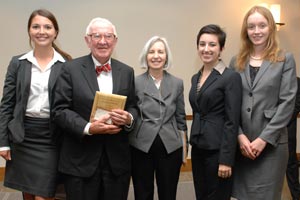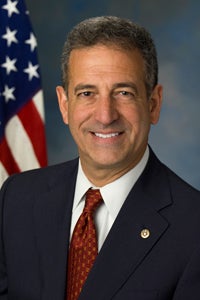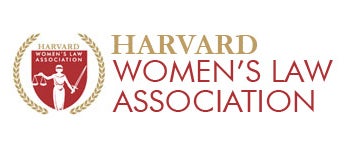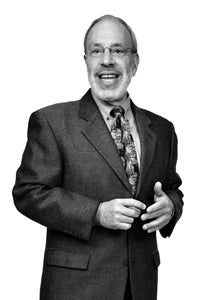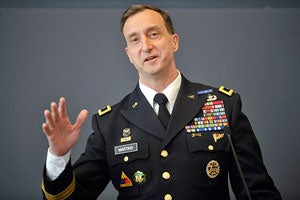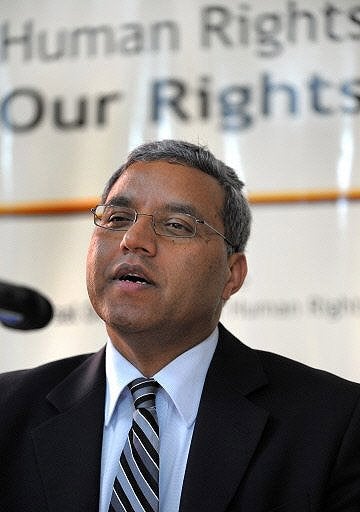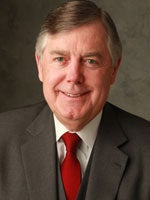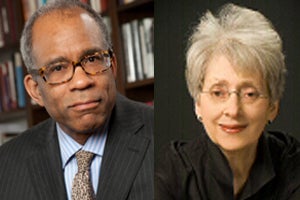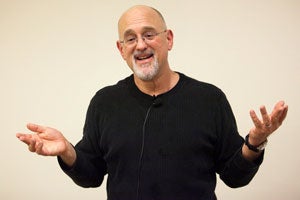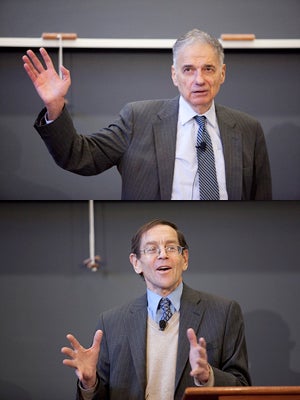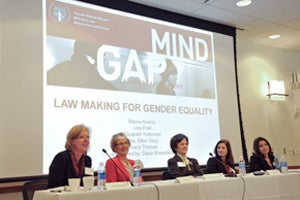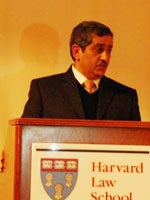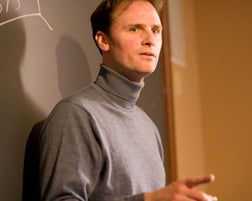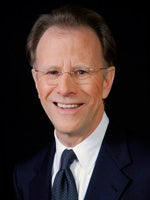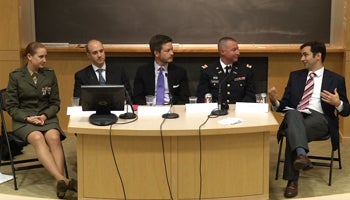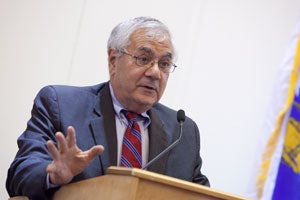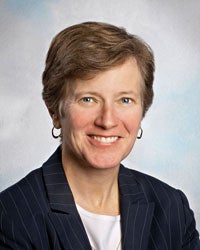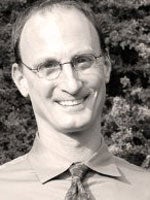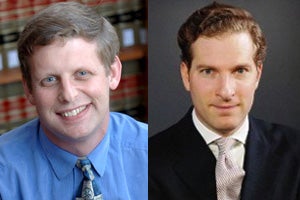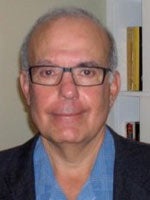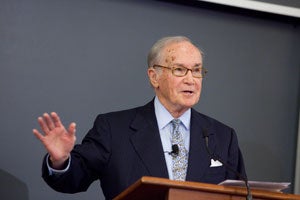Latest from Jill Greenfield
-
Goldberg on the NSA’s warrantless wireless wiretap
April 10, 2012
Steven Goldberg ’72 is part of the legal team challenging the National Security Agency’s warrantless wireless wiretap of an Islamic charity in southern Oregon. He visited Harvard Law School on March 31 to discuss the case in the context of how law students and lawyers working apart from large organizations can get involved in similar cases.
-
On April 3, Brigadier General Mark Martins ’90, chief prosecutor at the Office of U.S. Military Commissions in the Department of Defense, delivered a lecture at Harvard Law School on Legitimacy and the Limits of Command in Reformed Military Commissions. The lecture was sponsored by the National Security Journal and the National Security & Law Association.
-
On March 22, the Human Rights Program and International Legal Studies at Harvard Law School sponsored “Protecting Human Rights Through the Mechanism of UN Special Rapporteurs,” a talk by Surya Subedi. Subedi, United Nations Special Rapporteur on Human Rights in Cambodia and Professor of International Law at the University of Leeds, discussed the role of the Special Rapporteurs in combating human rights abuses and he shared anecdotes about his work in Cambodia.
-
On February 27, the Harvard Law School Program on the Legal Profession sponsored a lecture by ABA President William Robinson III about a critical issue facing the legal system – state court underfunding. Robinson outlined facts and figures that speak to the enormity of the crisis, and underscored what those numbers mean to those seeking justice and to the American concept of democracy.
-
Redistricting and voters rights
March 6, 2012
On Tuesday, Feb. 14, the Harvard Federalist Society and the Harvard Black Law Students Association co-sponsored a discussion about race and redistricting with Dr. Abigail Thernstrom of the Manhattan Institute and Professor Randall Kennedy, the Michael R. Klein Professor of Law at Harvard Law School.
-
In a talk entitled “How To Do Precisely the Right Thing At All Possible Times,” Daniel Gilbert, Professor of Psychology at Harvard University, author of “Stumbling on Happiness,” and host of the PBS television series “This Emotional Life,” discussed research in psychology, neuroscience and behavioral economics that explains why it is indeed possible, yet incredibly difficult, to do the right thing at all possible times.
-
Ralph Nader at HLS: The constitutional crimes of Bush and Obama
February 10, 2012
Ralph Nader ’58 and Bruce Fein ’72 visited Harvard Law School for a talk sponsored by the HLS Forum and the Harvard Law Record. At the event, “America's Lawless Empire: The Constitutional Crimes of Bush and Obama,” both men discussed what they called lawless, violent practices by the White House and its agencies that have become institutionalized by both political parties.
-
At Women’s Law conference, Attorney General of California tells students, ‘Part of breaking barriers is about innovation’
February 7, 2012
On February 3, the Harvard Women’s Law Association held its 6th annual conference. This year’s conference, entitled “Mind the Gap: Achieving Actual Parity,” was an open forum about achieving equality in the courtroom, workplace, and community. Kamala Harris, Attorney General of California, delivered the keynote address.
-
Fighting for human rights and press freedom in Bahrain: Possibilities and Limitations
December 1, 2011
The recent recipient of the Committee to Protect Journalists 2011 International Press Freedom Award, Dr. Mansoor al-Jamri visited Harvard Law School on Nov. 28 to discuss the fight for human rights and press freedom in Bahrain in light of the Arab Spring uprisings.
-
Palfrey on intellectual property strategy
November 29, 2011
According to John Palfrey, businesspeople are often insufficiently attentive to the ways that intellectual property rights can be acquired and exercised. His new book, “Intellectual Property Strategy” (MIT Press), is thus written with businesspeople in mind. Palfrey, Vice Dean for Library and Information Resources and Faculty Co-Director of the Berkman Center for Internet and Society, argues for leaders of businesses and non-profit organizations to adopt IP policies that go beyond the traditional, highly restrictive “sword and shield” approach, and that instead focus on flexibility and creativity.
-
National implications of state-led immigration reform
November 15, 2011
At an event about the national implications of state-led immigration reform, sponsored by Harvard Immigration Project, Advocates for Human Rights, and ACLU-HLS, Lucas Guttentag, senior counsel and former founding national director of the ACLU's Immigrants’ Rights Project, discussed Alabama's new immigration law, its significance for state efforts to regulate immigration, and where immigration advocates go from here.
-
OPIA sponsors “Careers in the Military” panel with HLS alums
November 14, 2011
Law students interested in a law firm career can attend firm-sponsored meet-and-greets to speak with associates. Students interested in public interest careers can meet one-on-one with visiting alumni advisors. But HLS students interested in military careers have fewer chances to mingle with those who have pursued that path. To provide that opportunity, OPIA welcomed to HLS five alumni who have served in the armed forces, to provide guidance and answer student questions.
-
Current marijuana policy encourages discrimination, says Congressman Barney Frank at HLS
October 21, 2011
At an event sponsored by the Harvard Law School American Constitution Society on October 18, Representative Barney Frank (D-MA) ’77 spoke about proposed legislation that would end the federal ban on marijuana, as well as the need for drug policy reform at the federal level and why marijuana policy is an issue better handled by the states.
-
GLAD’s Bonauto assesses litigation of the Defense of Marriage Act
October 14, 2011
At “Challenging and Litigating DOMA's Constitutionality”— an event that was co-sponsored by the Harvard Law School American Constitution Society, Lambda, and the Civil Rights-Civil Liberties Law Journal—Mary Bonauto, the Civil Rights Project Director at Gay & Lesbian Advocates & Defenders (GLAD), spoke about litigating the Defense of Marriage Act in federal courts in the wake of the Department of Justice's recent decision to stop defending the law.
-
A partner offers some advice to new lawyers
October 12, 2011
According to attorney and author Grover E. Cleveland, young lawyers should be reassured by assignments that require all-nighters. “If a senior lawyer left work on your desk and went to sleep, that means that you’ve successfully earned her trust,” he said. Cleveland offered this and other nuggets of wisdom at “Swimming Lessons for Baby Sharks: Thriving in the First Two Years of Law Practice,” an event jointly sponsored by the Harvard Law School Program on the Legal Profession and Office of Career Services on October 4.
-
Eugene Volokh, professor at UCLA School of Law, well known to some law students for his blog, The Volokh Conspiracy, gave a lecture on slippery slope arguments at an event sponsored by the Harvard Law School Federalist Society on September 20th. He was joined by Noah Feldman, Bemis Professor of International Law at Harvard Law School, who provided a response.
-
Harvard’s Labor and Worklife Program looks at challenges facing workers in communications and media
September 22, 2011
Will knowledge, information, and communication workers of the world unite? This question was explored by Vincent Mosco, professor emeritus of communications at Queen's University, Canada, at a presentation sponsored by the Labor and Worklife Program at Harvard Law School on September 19.
-
A Vast Wasteland Revisited
September 14, 2011
In 1961, Newton Minow – then Chairman of the Federal Communications Commission – delivered a landmark speech to the National Association of Broadcasters on “Television and the Public Interest,” in which he described television programming as a "vast wasteland" and advocated for public interest programming. He challenged his audience “to sit down in front of your own television set when your station goes on the air and stay there, for a day, without a book, without a magazine, without a newspaper…to distract you. Keep your eyes glued to that set until the station signs off. I can assure you that what you will observe is a vast wasteland.” Fifty years– and innumerable advances in media communications – later, Minow visited Harvard Law School for a forum exploring the future of journalism and the role of the state in the construction of the public sphere.
- 1
- 2
